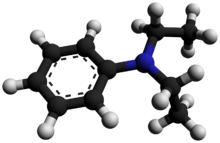Chemistry:Diethylaniline

| |

| |
| Names | |
|---|---|
| Preferred IUPAC name
N,N-Diethylaniline | |
| Other names
N-Phenyldiethylamine; Diethylaminobenzene[1]
| |
| Identifiers | |
3D model (JSmol)
|
|
| ChemSpider | |
PubChem CID
|
|
| UNII | |
| |
| |
| Properties | |
| C10H15N | |
| Molar mass | 149.237 g·mol−1 |
| Appearance | Colorless to yellowish liquid[2] |
| Odor | Aniline-like[2] |
| Density | 0.93 g/mL[2] |
| Melting point | −38 °C (−36 °F; 235 K)[2] |
| Boiling point | 216 °C (421 °F; 489 K)[2] |
| 0.13 g/L[2] | |
| Hazards | |
| Flash point | 83 °C (181 °F; 356 K)[2] |
| 330 °C (626 °F; 603 K)[2] | |
Except where otherwise noted, data are given for materials in their standard state (at 25 °C [77 °F], 100 kPa). | |
| Infobox references | |
Diethylaniline is the organic compound with the molecular formula (C2H5)2NC6H5. It is a colorless liquid but commercial samples are often yellow. It is a precursor to several dyes and other commercial products.
Uses
Its condensation with half an equivalent of benzaldehyde gives brilliant green, an analogue of the very useful malachite green. With formylbenzenedisulfonic acid it condenses to give Patent blue VE, and with hydroxybenzaldehyde followed by sulfonation one obtains Patent blue V. When treated with phosgene, one obtains Ethyl violet, an analogue of methyl violet.[3]
In organic synthesis, the complex diethylaniline·borane (DEANB) is used as a reducing agent.[4]
Diethylaniline and dimethylaniline are both used as acid-absorbing bases. The advantage to the diethyl derivative is that [C
6H
5NEt
2H]Cl is non-hygroscopic, in contrast to [C
6H
5NMe
2H]Cl.[5]
Safety
Diethylaniline may be genotoxic because it has been found to increase the rate of sister chromatid exchange.[6]
See also
References
- ↑ N,N-Diethylaniline at chemicalland21.com
- ↑ 2.0 2.1 2.2 2.3 2.4 2.5 2.6 2.7 Record in the GESTIS Substance Database of the Institute for Occupational Safety and Health
- ↑ Gessner, Thomas; Mayer, Udo (2000). "Ullmann's Encyclopedia of Industrial Chemistry". Ullmann's Encyclopedia of Industrial Chemistry. Weinheim: Wiley-VCH. doi:10.1002/14356007.a27_179.
- ↑ Salunkhe, Ashok M.; Burkhardt, Elizabeth R. (1997). "N,N-Diethylaniline·borane, an efficient reducing agent for reduction of representative functional groups". Tetrahedron Letters 38 (9): 1519. doi:10.1016/S0040-4039(97)00127-5.
- ↑ Ford-Moore, A. H.; Perry, B. J. (1951). "Triethyl Phosphite". Org. Synth. 31: 111. doi:10.15227/orgsyn.031.0111.
- ↑ Li, Q; Minami, M (1997). "Sister chromatid exchanges of human peripheral blood lymphocytes induced by N,N-diethylaniline in vitro". Mutation Research 395 (2–3): 151–7. doi:10.1016/s1383-5718(97)00162-9. PMID 9465926.
 |
